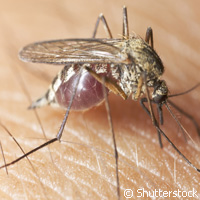Study finds protective shield fights malaria superinfection
Parasites responsible for triggering full-blown malaria initially travel to the liver, multiply and then flee and invade red blood cells. The common position for researchers is that parasites must feed on iron to grow. New research, however, points out that patients diagnosed with full-blown malaria could be protected against new infections following activation of a hormone ensuring that liver cells cannot feed on iron. The study, presented in the journal Nature Medicine, was partially supported through COST (European Cooperation in Science and Technology), a programme backed by the EU's Research and Technological Development (RTD) Framework Programme. The discovery could lead to improved management and prevention methods of malaria. Researchers led by the Instituto de Medicina Molecular (IMM) at the University of Lisbon in Portugal targeted the development of malaria parasites in both the liver and red blood cells, and focused on 'superinfection' cases, where an individual diagnosed with full-blown malaria is bitten by a second infected mosquito. Their findings demonstrate that the second mosquito bite of an organism already hosting blood parasites will not trigger a full-blown second infection. The first infection blocks the superinfection in the liver. This discovery is positive news for people living in high-risk areas. The data show for the first time that iron plays a vital role in the development of multiple malarial infections, which has strong implications for iron supplementation used to fight anaemia in malaria-endemic regions, according to the researchers. The blood parasites do not grow because they are starved of iron, thanks to this protective shield. 'I am very happy that we were able to find such an interesting interaction occurring between different malaria parasite stages in a single host, and that this might contribute for future control of malaria,' says IMM's Dr Silvia Portugal, lead author of the study. For her part, Dr Maria Mota, also from IMM and study leader, says: 'Our findings help explain the differences in infection risk and complexity of infections in young individuals observed in endemic-malaria regions that have hitherto required speculative explanations. Also, they challenge the idea that infection in distinct cell types is independent, which may have an impact in future research in the field of infectious diseases as a whole.' Commenting on the results, Dr Hal Drakesmith, who co-led the study at the Weatherall Institute of Molecular Medicine and Oxford University in the United Kingdom, says: 'Now that we understand how malaria parasites protect their territory in the body from competitor parasites, we may be able to enhance this natural defence mechanism to combat the risk of malaria infections. At the same time we may need to look again at the advisability of iron supplementation programmes in malaria-endemic regions, as possible increased risk of infection may need to be weighed against benefits - more data is needed on this issue.' More than 300 million people are affected by malaria each year, and 800 000 lose the battle against this deadly disease.For more information, please visit:Instituto de Medicina Molecular (IMM):http://imm.fm.ul.pt/web/imm/homeNature Medicine:http://www.nature.com/nm/index.htmlCOST Programme:http://www.cost.esf.org/
Countries
Portugal, United Kingdom



